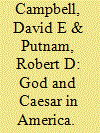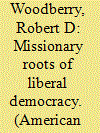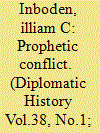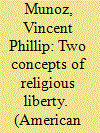|
|
|
Sort Order |
|
|
|
Items / Page
|
|
|
|
|
|
|
| Srl | Item |
| 1 |
ID:
110922


|
|
|
|
|
| Publication |
2012.
|
| Summary/Abstract |
A Feb. 29 update to the print story from the March/April issue: In the wake of the Great Recession it would seem natural that the 2012 election would be fought over economic issues. Yet so far in the Republican primaries, we have seen social issues, and religion especially, move to the forefront. Rick Santorum is only the latest in a series of Republicans who have infused their campaigns with talk about God. Even Mitt Romney, a Mormon who has generally tried to avoid discussing religion, has recently pledged to defend "religious liberty" against the Obama administration. Increasingly, the rhetoric of the leading Republican contenders echoes the Republican fringe of twenty years ago. Then, we heard Pat Buchanan -- the quintessential protest candidate -- bombastically declare that America was in the midst of a culture war. Today, the frontrunners all play to the Republican base by describing the White House's "war on religion."
|
|
|
|
|
|
|
|
|
|
|
|
|
|
|
|
| 2 |
ID:
113552


|
|
|
|
|
| Publication |
2012.
|
| Summary/Abstract |
This article demonstrates historically and statistically that conversionary Protestants (CPs) heavily influenced the rise and spread of stable democracy around the world. It argues that CPs were a crucial catalyst initiating the development and spread of religious liberty, mass education, mass printing, newspapers, voluntary organizations, and colonial reforms, thereby creating the conditions that made stable democracy more likely. Statistically, the historic prevalence of Protestant missionaries explains about half the variation in democracy in Africa, Asia, Latin America and Oceania and removes the impact of most variables that dominate current statistical research about democracy. The association between Protestant missions and democracy is consistent in different continents and subsamples, and it is robust to more than 50 controls and to instrumental variable analyses.
|
|
|
|
|
|
|
|
|
|
|
|
|
|
|
|
| 3 |
ID:
146579


|
|
|
|
|
| Summary/Abstract |
Religious freedom in the United States is widely enjoyed and vigorously protected. Yet, a substantial percentage of Americans believe that their religious liberties are threatened. This article investigates the origins of these perceptions, focusing on the role of political orientations, religious identities and behaviors, social issues (i.e., gay marriage and abortion), and news attentiveness. We found that perceptions of threat are related to political orientations (i.e., partisan affiliation, ideology, and Tea Party identification) and issue positions (i.e., opposition to gay marriage). Consistent with theories of elite cue-taking, the effects of partisan affiliation are contingent on news attentiveness. Republicans who pay closer attention to the news are more likely to state that their religious liberties are threatened.
|
|
|
|
|
|
|
|
|
|
|
|
|
|
|
|
| 4 |
ID:
132008


|
|
|
|
|
| Publication |
2014.
|
| Summary/Abstract |
This article traces the development of Reinhold Niebuhr's growing alarm over the rise of Nazi Germany and Imperial Japan leading up to World War II, and his corresponding warnings to the United States and allied powers of the need to confront fascist aggression. The theme of the "prophetic" shaped Niebuhr's perception of the threat of fascism, both through his concern over the religious liberty of Christian and Jewish voices to bring prophetic judgments against totalitarian governments and through his predictions of the threat that fascist regimes posed to the international order. In the course of the 1930s Niebuhr also refined his doctrine of Christian realism, which both influenced yet differed from the evolution of realism as a theory of international relations. Niebuhr's development over this decade also marked his transition from the margins to the center of American intellectual and political life.
|
|
|
|
|
|
|
|
|
|
|
|
|
|
|
|
| 5 |
ID:
159480


|
|
|
|
|
| Summary/Abstract |
Against the legal recognition of same-sex marriage, many advocates of religious liberty argue that those who adhere to “traditional” understandings of marriage should not be forced to “recognize” same-sex marriages. This includes exempting individual business owners engaged in commercial activity from anti-discrimination laws. I argue that such exemptions overreach. Equal access to the commercial arena is an essential feature of life in America’s commercial republic, which means that public accommodations should not be given exemptions on religious grounds. Yet this does not require business owners to morally approve of same-sex marriage; nor does it require them to grant same-sex marriages “equal concern and respect.” Rather, it requires simple toleration, which is compatible with moral disapproval. Indeed, I argue that this is the very sort of toleration at the foundation of religious liberty in America. Efforts to grant religious exemptions to anti-discrimination laws invite the return of religious conflict and discrimination. Prohibiting discrimination on the basis of sexual orientation in public accommodations is necessary not only for equal citizenship, but to maintain the regime of toleration that undergirds religious liberty in a pluralistic democracy.
|
|
|
|
|
|
|
|
|
|
|
|
|
|
|
|
| 6 |
ID:
147246


|
|
|
|
|
| Summary/Abstract |
Due in part to the influence of Michael McConnell, free exercise exemptionism is generally thought to be compatible with, if not dictated by, the founders’ church-state political philosophy. This article rejects that position, arguing instead that America's constitutional tradition offers two distinct conceptions of religious liberty: the founders’ natural rights free exercise and modern moral autonomy exemptionism. The article aims to distinguish these two approaches by clarifying how they are grounded upon divergent philosophical understandings of human freedom and by explaining how they advance different views of what religious liberty is, how it is threatened, and, accordingly, how it is best protected. The article also attempts to demonstrate how our modern approach expands the protection for religious liberty in some ways but limits it in others.
|
|
|
|
|
|
|
|
|
|
|
|
|
|
|
|
|
|
|
|
|